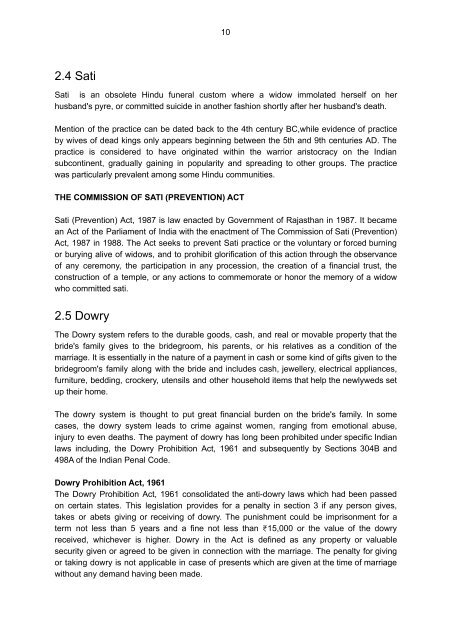F I - Google Docs
Create successful ePaper yourself
Turn your PDF publications into a flip-book with our unique Google optimized e-Paper software.
10<br />
2.4 Sati<br />
Sati is an obsolete Hindu funeral custom where a widow immolated herself on her<br />
husband's pyre, or committed suicide in another fashion shortly after her husband's death.<br />
Mention of the practice can be dated back to the 4th century BC,while evidence of practice<br />
by wives of dead kings only appears beginning between the 5th and 9th centuries AD. The<br />
practice is considered to have originated within the warrior aristocracy on the Indian<br />
subcontinent, gradually gaining in popularity and spreading to other groups. The practice<br />
was particularly prevalent among some Hindu communities.<br />
THE COMMISSION OF SATI (PREVENTION) ACT<br />
Sati (Prevention) Act, 1987 is law enacted by Government of Rajasthan in 1987. It became<br />
an Act of the Parliament of India with the enactment of The Commission of Sati (Prevention)<br />
Act, 1987 in 1988. The Act seeks to prevent Sati practice or the voluntary or forced burning<br />
or burying alive of widows, and to prohibit glorification of this action through the observance<br />
of any ceremony, the participation in any procession, the creation of a financial trust, the<br />
construction of a temple, or any actions to commemorate or honor the memory of a widow<br />
who committed sati.<br />
2.5 Dowry<br />
The Dowry system refers to the durable goods, cash, and real or movable property that the<br />
bride's family gives to the bridegroom, his parents, or his relatives as a condition of the<br />
marriage. It is essentially in the nature of a payment in cash or some kind of gifts given to the<br />
bridegroom's family along with the bride and includes cash, jewellery, electrical appliances,<br />
furniture, bedding, crockery, utensils and other household items that help the newlyweds set<br />
up their home.<br />
The dowry system is thought to put great financial burden on the bride's family. In some<br />
cases, the dowry system leads to crime against women, ranging from emotional abuse,<br />
injury to even deaths. The payment of dowry has long been prohibited under specific Indian<br />
laws including, the Dowry Prohibition Act, 1961 and subsequently by Sections 304B and<br />
498A of the Indian Penal Code.<br />
Dowry Prohibition Act, 1961<br />
The Dowry Prohibition Act, 1961 consolidated the antidowry laws which had been passed<br />
on certain states. This legislation provides for a penalty in section 3 if any person gives,<br />
takes or abets giving or receiving of dowry. The punishment could be imprisonment for a<br />
term not less than 5 years and a fine not less than ₹15,000 or the value of the dowry<br />
received, whichever is higher. Dowry in the Act is defined as any property or valuable<br />
security given or agreed to be given in connection with the marriage. The penalty for giving<br />
or taking dowry is not applicable in case of presents which are given at the time of marriage<br />
without any demand having been made.


